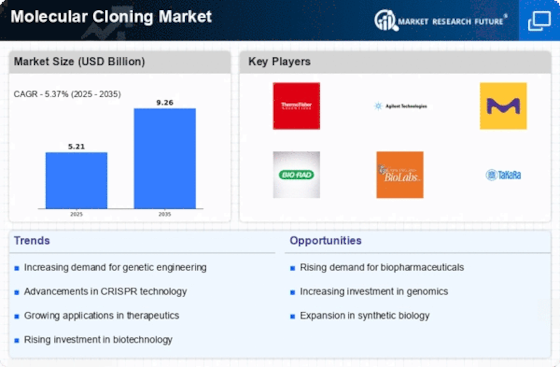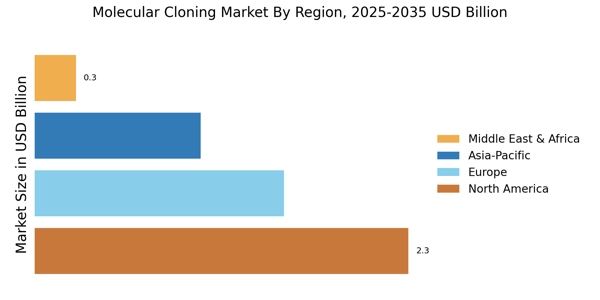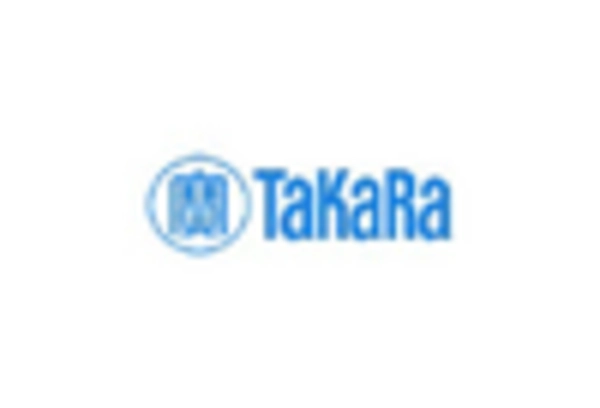Growing Applications in Medicine
The applications of molecular cloning in medicine are expanding, significantly impacting the Molecular Cloning Market. Techniques such as gene cloning and recombinant DNA technology are pivotal in developing therapeutic proteins, monoclonal antibodies, and gene therapies. The increasing prevalence of chronic diseases and genetic disorders has led to a heightened focus on personalized medicine, which relies heavily on molecular cloning techniques. Market data indicates that the therapeutic proteins segment is projected to reach USD 300 billion by 2026, underscoring the critical role of molecular cloning in medical advancements. This growing reliance on molecular cloning for medical applications is likely to drive market growth.
Rising Demand for Biopharmaceuticals
The demand for biopharmaceuticals is on the rise, significantly influencing the Molecular Cloning Market. As the healthcare sector shifts towards biologics, the need for molecular cloning techniques to produce these complex drugs becomes paramount. Biopharmaceuticals, which include therapeutic proteins and monoclonal antibodies, are projected to account for over 25% of the total pharmaceutical market by 2025. This trend indicates a growing reliance on molecular cloning for the production of these biologics, thereby driving market growth. The increasing investment in biopharmaceutical research and the development of novel therapies are likely to further enhance the demand for molecular cloning technologies.
Increasing Research and Development Activities
The Molecular Cloning Market is experiencing a surge in research and development activities, driven by the need for innovative solutions in biotechnology and pharmaceuticals. Organizations are investing heavily in R&D to explore new applications of molecular cloning techniques, which are essential for gene therapy, vaccine development, and agricultural biotechnology. According to recent data, the biotechnology sector has seen a compound annual growth rate of approximately 7.4%, indicating a robust interest in molecular cloning methodologies. This trend suggests that as more institutions allocate resources towards R&D, the demand for molecular cloning products and services will likely increase, further propelling the market forward.
Expanding Academic and Industrial Collaborations
Collaborations between academic institutions and industry players are expanding, positively impacting the Molecular Cloning Market. These partnerships facilitate knowledge transfer and resource sharing, leading to accelerated innovation in molecular cloning techniques. Academic institutions often provide cutting-edge research, while industry players contribute practical applications and commercialization strategies. This synergy is crucial for advancing molecular cloning technologies and expanding their applications across various sectors, including agriculture and environmental science. The increasing number of joint ventures and research collaborations is expected to enhance the market landscape, as stakeholders seek to leverage collective expertise to drive advancements in molecular cloning.
Technological Advancements in Cloning Techniques
Technological advancements are reshaping the Molecular Cloning Market, with innovations enhancing the efficiency and accuracy of cloning processes. The introduction of CRISPR technology and other genome editing tools has revolutionized molecular cloning, allowing for precise modifications in genetic material. These advancements not only streamline the cloning process but also reduce costs associated with research and development. As a result, the market is witnessing an influx of new players and products, contributing to a competitive landscape. The increasing adoption of these advanced techniques is expected to bolster the market, as researchers seek to leverage cutting-edge technologies for their cloning needs.

















